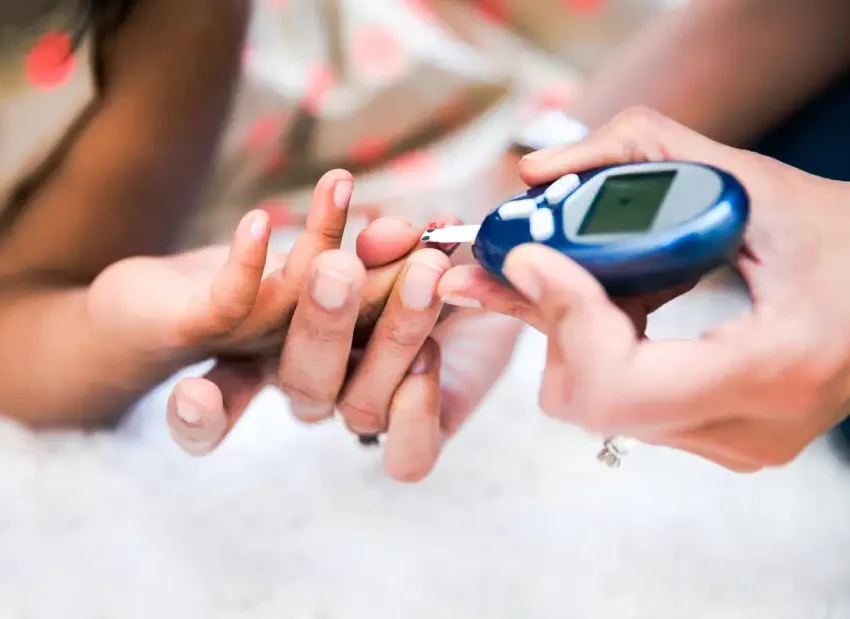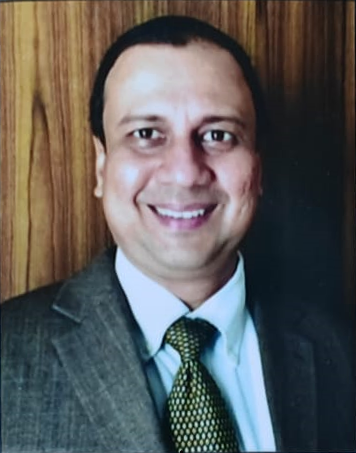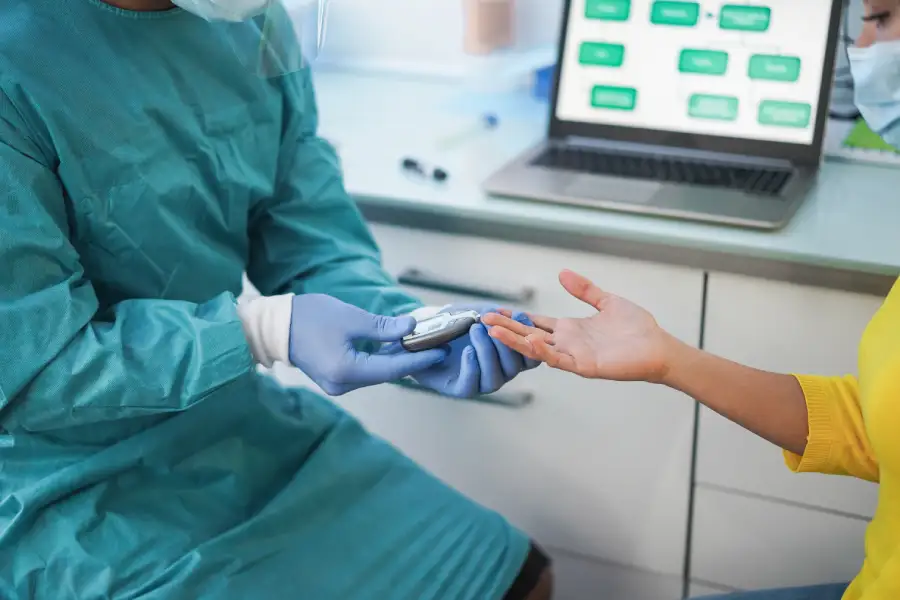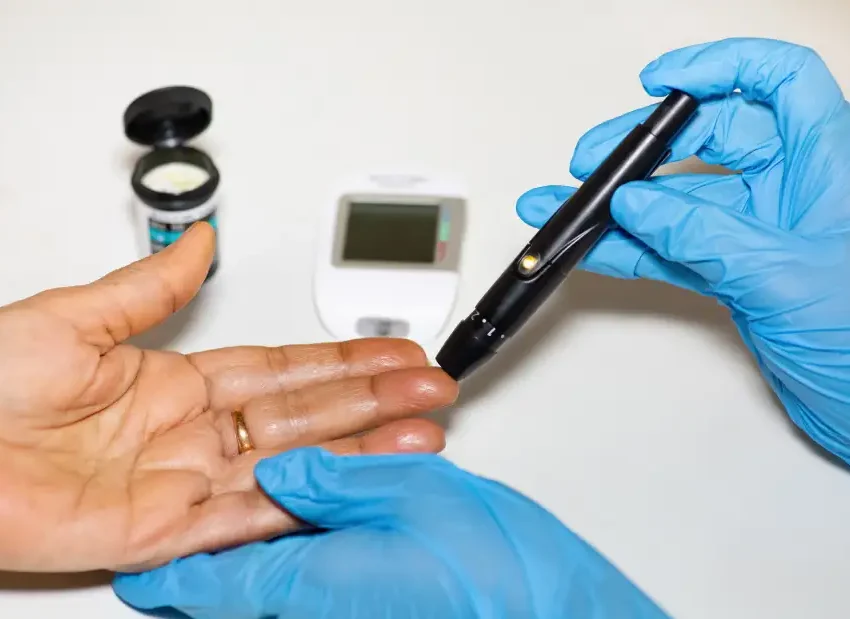Diabetology
According to the National Diabetes Survey Report released in 2019, the prevalence of diabetes in the Indian population is around 12 per cent. Among these, the highest prevalence is seen in senior citizens within the age group of 70-79 years.
Diabetological problems
treated in the Department
According to the World Health Organization (WHO), people with diabetes are two-three times more likely to suffer heart attacks and strokes. Over time uncontrolled blood sugar levels can damage the blood vessels.
This is painful condition wherein high blood sugar levels are responsible for nerve damage, most often affecting the lower limbs. Infection can cause pain and numbness in the legs and feet and at its worse can even lead to amputation.
When the diabetes is not treated on time or is uncontrollable it can lead to eye problems mostly caused by damage to the blood vessels in the retina. This can lead to blindness.
People with long-term diabetes are more likely to be diagnosed with kidney failure compared to those with normal blood sugar levels. The onslaught of high blood glucose levels over time wreaks havoc on the kidney, resulting in damage.

OUR DOCTORS
Meet Our Consultant's

Dr.D.K.Sriram
MBBS, MRCP(UK), MSC DIABETES (UK), MRCP ENDOCRINOLOGY & DIABETES (UK)
Consultant - Endocrinologist & diabetologist
Session : Morning
Master Health Check
We have a wide range of comprehensive health check customised to the needs of every individual and designed by highly-experienced doctors. The Preventive Medicine facility has all the advanced technology, with friendly staff so that the patients can get their check done in a warm and welcoming atmosphere, under the supervision of experts. Our Master Health Check is tailored to the needs of the patients and has an array of diagnostic tests that ascertain the functions of vital organs such as kidney, heart, lungs, liver and reproductive organs. Detailed blood and urine tests are done to identify any hidden ailments. Based on the results of the tests, a clinician would advice the patient on leading a healthy and balanced life.
Various packages available in the Master Health Check programme
- Consulation – Gyenaecology
- Consulation – General Physician
- Consulation Opththalmology
- Urostrip/Urine Routine
- Blood Glucose Fasting
- Blood Glucose Post Prandal
- S Creatinine
- Blood Urea
- Complete Haemogram Package
- Blood Group RH typing
- Chest X-RAY PA view
- Resting ECG
- TSH
- Ultrasonic Scan – Abdomen
- HBA1C
- Consulation – Opththalmology
- Consulation – General Medicine
- Consulation – Dental
- Consulation – Opththalmology
- Consulation – General Medicine
- Consulation – Dental
- Consulation – Gynaecology
- Urine Routine
- Micro Albuminuria
- Blood Glucose Fasting
- Blood Glucose Post Prandal
- S creatine
- S Uric Acid
- Blood Urea
- Complete Haemogram Package
- Blood Group RH Typing
- Chest X-RAY PA view
- Resting ECG
- TSH
- Ultrasound Scan – Abdomen
- Lipid Profile
- Papsmear
- LFT-2 package
- Mammogram – Digital
- HBA1C
- Consulation – Opththalmology
- Consulation – General Medicine
- Consulation – Dental
- Urine Routine
- Blood Glucose Fasting
- Blood Glucose Post Prandal
- S creatine
- S Uric Acid
- Blood Urea
- Complete Haemogram Package
- Blood Group RH Typing
- Chest X-RAY PA view
- Resting ECG
- TSH
- Ultrasound Scan – Abdomen
- Lipid Profile
- Liver Function Test
- HBA1C
- Consulation – Opththalmology
- Consulation – General Medicine
- Consulation –
- Gynaecology
- Urine Routine
- Blood Glucose Fasting
- Blood Glucose Post Prandal
- Complete Haemogram Package
- Chest X-RAY PA view
- Resting ECG
- Ultrasound Scan –
- Abdomen
- HBA1C
- Consulation – Opththalmology
- Consulation – General Medicine
- Consulation – Dental
- Consulation – General Surgery
- Blood Glucose Fasting
- Blood Glucose Post Prandal
- Complete Haemogram Package
- Blood Group RH Typing
- Urea
- S Creatinine
- S Uric Acid
- Chest X-RAY PA view
- Resting ECG
- Ultrasound Scan – Abdomen
- HBA1C
- TSH
- Lipid Profile
- Urostrip/Urine Routine
- LFT-2 package
- Resting ECG
- PSA Total
- Consulation – Opththalmology
- Consulation – General Medicine
- Consulation – Dental
- Blood Glucose Fasting
- Blood Glucose Post Prandal
- S Cholestrol
- Complete Haemogram Package
- Blood Group RH Typing
- Resting ECG
- Stool Routine
- S Creatinine
- Urea + S Uric Acid
- S Bilirubin (Total/Direct)
- Urine Routine
- Chest X-RAY PA View
- Ultrasonic Whole Abdomen
- TSH
- Consulation – Opththalmology
- Consulation – General Medicine
- Consulation – Dental
- Consulation – Ophthalmology
- Blood Group RH Typing
- Lipid Profile
- HBA1C
- Blood Urea
- TSH
- Resting ECG
- Chest X-RAY PA View
- Ultrasound Scan – Abdomen
- S Creatinine
- S Uric Acid
- Urine Routine
- Complete Haemogram Package
- Blood Glucose Fasting
- Blood Glucose Post Prandal
State-of-the-Art
Facilities
To prevent cardiac and kidney problems
Diabetes foot care solutions
Management of gestational diabetes
Comprehensive Diabetes Care
Diabetes eye care programme
Customised diet plan

Our Special
Treatments
We believe that prevention measures, recognition of early signs and timely intervention go a long way in effective control and management of blood sugar levels.
The first step in our comprehensive diabetes management programme is to identify high-risk individuals (pre-diabetes), educate them on signs and symptoms, and spread awareness about prevention of complications.
Our highly-experienced doctors also give them necessary advice on lifestyle changes, diet and fitness.
Early diagnosis is important to beat diabetes and to this end our department offers effective solutions that focus on timely detection and management of the disorder and its complications.
We provide essential guidance to our patients on self-care and managing their health in the long-term.
Signs that Indicate you
Should see a Diabetologist
Feeling of extreme tiredness
Feeling of extreme tiredness
Frequent urination
Tingling sensation in hands and feet
Increased hunger and thirst

About
Diabetology
Among these, the highest prevalence is seen in senior citizens within the age group of 70-79 years.
But, younger populations are also prone to developing diabetes because of sedentary lifestyle, poor diet and lack of exercise.
In Type 1 diabetes, sometimes called childhood-onset diabetes, the body is not able to produce insulin, so the patient has to take insulin every day.


